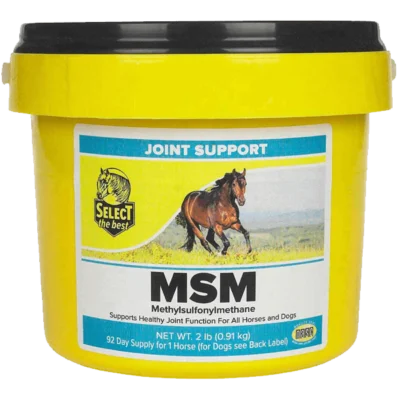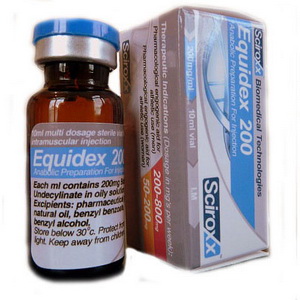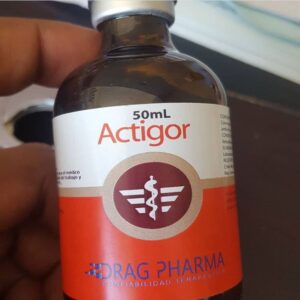MSM for Equine Joint Support:
Methylsulfonylmethane MSM for Equine Joint Support is an organosulfur compound naturally found in plants, animals, and humans. It’s a white, crystalline substance that provides bioavailable sulfur, an essential mineral for various biological processes. In equine nutrition, MSM has gained significant attention as a joint support supplement.
Chemical Properties and Bioavailability
MSM has the chemical formula (CH₃)₂SO₂ and is highly water-soluble, making it readily absorbed in the digestive tract. Unlike some sulfur compounds, MSM crosses biological membranes easily and has excellent bioavailability when administered orally to horses.
Mechanisms of Action for Joint Health
Sulfur Donation
MSM provides sulfur atoms necessary for the synthesis of:
Collagen: Primary structural protein in cartilage, tendons, and ligaments
Chondroitin sulfate: Key component of cartilage matrix
Keratin: Important for hoof health and integrity
Glutathione: Powerful antioxidant that protects joint tissues MSM for Equine Joint Support
Anti-inflammatory Properties
Research suggests MSM may help reduce inflammation through:
Inhibition of certain inflammatory cytokines
Reduction of oxidative stress in joint tissues
Potential modulation of immune responses
Cartilage Support
MSM may support cartilage health by:
Providing building blocks for glycosaminoglycans (GAGs)
Supporting the structural integrity of the cartilage matrix
Potentially slowing cartilage degradation processes
Clinical Benefits for Horses
Joint Comfort and Mobility
Many horse owners and veterinarians report improvements in:
Overall joint comfort during movement
Flexibility and range of motion
Recovery time after exercise MSM for Equine Joint Support
General mobility, particularly in older horses
Performance Support
For athletic horses, MSM supplementation may contribute to:
Better exercise tolerance
Reduced stiffness after intense work
Support for joints under repetitive stress
Maintenance of joint function during training
Additional Benefits
Beyond joint support, MSM may also provide:
Hoof health improvement: Supporting stronger, more flexible hooves
Coat quality: Contributing to healthier skin and hair
General antioxidant support: Protecting against cellular damage
Dosage Guidelines
Standard Dosing
Maintenance dose: 5-10 grams daily for average-sized horses (1,000-1,200 lbs)
Loading dose: Some protocols suggest 15-20 grams daily for the first 2-4 weeks
Body weight adjustment: Approximately 5-8 mg per pound of body weight
MSM for Equine Joint Support Administration Considerations
MSM is typically administered once or twice daily
Can be mixed with feed or given separately
Highly palatable for most horses
Water-soluble, so excess amounts are readily excreted
Timeline for Effects
Initial improvements may be noticed within 2-4 weeks
Full benefits often develop over 6-8 weeks of consistent use
Long-term supplementation is generally recommended for sustained benefits
Safety Profile
General Safety
MSM has an excellent safety record in horses with:
Very low toxicity levels
Wide margin of safety between therapeutic and harmful doses
Minimal risk of overdose due to water-soluble nature
Side Effects
Reported side effects are rare but may include:
Mild digestive upset if introduced too quickly
Temporary loose stools (usually resolves with continued use)
Very rare allergic reactions MSM for Equine Joint Support
Drug Testing Considerations
MSM is generally not prohibited in most equine competitions
Always verify current regulations with specific governing bodies
Detection times are typically short due to rapid excretion
Quality and Selection Criteria
Purity Standards
Look for MSM products that offer:
High purity levels: 99%+ pure MSM
Third-party testing: Verification of purity and absence of contaminants
Heavy metal screening: Ensuring low levels of potentially harmful metals
Microbiological testing: Confirming absence of harmful bacteria or mold
Manufacturing Considerations
Source quality: Reputable manufacturers with good quality control
Processing methods: Proper crystallization and purification processes
Packaging: Protection from moisture and contamination
Expiration dating: Proper stability testing and dating
Integration with Other Joint Supplements
Complementary Supplements
MSM works well in combination with:
Glucosamine: Provides additional cartilage building blocks
Chondroitin sulfate: Enhances cartilage matrix support
Hyaluronic acid: Supports joint fluid viscosity
Omega-3 fatty acids: Provides additional anti-inflammatory support
Vitamin C: Enhances collagen synthesis MSM for Equine Joint Support
Antioxidants: Provides additional cellular protection
Synergistic Effects
The combination of MSM with other joint supplements may provide:
Enhanced overall joint support
More comprehensive nutritional coverage
Potentially improved clinical outcomes
Better long-term joint maintenance
Veterinary Considerations
Professional Guidance
It’s recommended to:
Consult with a veterinarian before starting any supplement program
Discuss specific needs based on the horse’s age, activity level, and joint health status
Monitor progress and adjust dosing as needed
Consider regular joint evaluations to assess supplement effectiveness
Medical Conditions
Special consideration should be given for horses with:
Existing joint diseases or injuries MSM for Equine Joint Support
Metabolic conditions that might affect supplement absorption
Concurrent medications that might interact
Previous adverse reactions to sulfur-containing compounds
Economic Considerations
Cost-Effectiveness
MSM is generally one of the more affordable joint supplements
Bulk purchasing can reduce per-dose costs
Long shelf life when stored properly
High bioavailability means efficient utilization
Value Assessment
When evaluating MSM supplements, consider:
Cost per effective dose rather than per container
Quality certifications and testing
Manufacturer reputation and support
Integration with overall management program
MSM for Equine Joint Support Storage and Handling
Proper Storage
Store in a cool, dry environment
Protect from excessive moisture and humidity
Keep containers tightly sealed
Avoid exposure to direct sunlight
Maintain temperature below 77°F (25°C) when possible
Shelf Life
Properly stored MSM typically maintains potency for 2-3 years
Check expiration dates regularly
Look for signs of clumping or discoloration that might indicate degradation
When in doubt, replace with fresh product
Conclusion
MSM represents a well-researched, safe, and potentially beneficial supplement for equine joint support. Its excellent safety profile, high bioavailability, and multiple mechanisms of action make it a valuable component of comprehensive joint health programs for horses. While individual responses may vary, many horses show improved comfort and mobility with consistent MSM supplementation. MSM for Equine Joint Support
The key to success with MSM supplementation lies in consistent daily administration, appropriate dosing, quality product selection, and integration with proper veterinary care and management practices. As with any supplement program, working closely with a qualified equine veterinarian ensures the best outcomes for individual horses.
For optimal results, MSM should be viewed as part of a comprehensive approach to equine joint health that includes proper nutrition, appropriate exercise, regular veterinary care, and attention to overall management factors that affect joint health and longevity.




Reviews
There are no reviews yet.